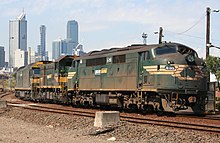lokomotiv
Danish
[edit]
Etymology
[edit]Borrowed from English locomotive, from French locomotif, from Latin locō (literally “from a place”) (ablative of locus (“place”)) + Vulgar Latin mōtivus (“moving”).
Pronunciation
[edit]IPA(key): [loɡomoˈtˢiwˀ, lɔɡ(o)moˈtˢiwˀ]
Noun
[edit]lokomotiv n (singular definite lokomotivet, plural indefinite lokomotiver)
- (rail transport) locomotive (self-propelled vehicle that runs on rails)
Inflection
[edit]| neuter gender |
Singular | Plural | ||
|---|---|---|---|---|
| indefinite | definite | indefinite | definite | |
| nominative | lokomotiv | lokomotivet | lokomotiver | lokomotiverne |
| genitive | lokomotivs | lokomotivets | lokomotivers | lokomotivernes |
Norwegian Bokmål
[edit]Etymology
[edit]Borrowed from English locomotive.
Noun
[edit]lokomotiv n (definite singular lokomotivet, indefinite plural lokomotiv or lokomotiver, definite plural lokomotiva or lokomotivene)
Synonyms
[edit]Derived terms
[edit]References
[edit]“lokomotiv” in The Bokmål Dictionary.
Norwegian Nynorsk
[edit]Etymology
[edit]Borrowed from English locomotive.
Noun
[edit]lokomotiv n (definite singular lokomotivet, indefinite plural lokomotiv, definite plural lokomotiva)
Synonyms
[edit]Derived terms
[edit]References
[edit]“lokomotiv” in The Nynorsk Dictionary.
Swedish
[edit]
Etymology
[edit]Borrowed from English locomotive, from French locomotif, from Latin locō (literally “from a place”) (ablative of locus (“place”)) + Vulgar Latin mōtivus (“moving”).
Noun
[edit]lokomotiv n
- (rail transport) a locomotive (self-propelled vehicle that runs on rails)
- Synonym: lok
Declension
[edit]Related terms
[edit]References
[edit]- Danish terms borrowed from English
- Danish terms derived from English
- Danish terms derived from French
- Danish terms derived from Latin
- Danish terms derived from Vulgar Latin
- Danish terms with IPA pronunciation
- Danish lemmas
- Danish nouns
- Danish neuter nouns
- da:Rail transportation
- Norwegian Bokmål terms borrowed from English
- Norwegian Bokmål terms derived from English
- Norwegian Bokmål lemmas
- Norwegian Bokmål nouns
- Norwegian Bokmål neuter nouns
- nb:Rail transportation
- Norwegian Nynorsk terms borrowed from English
- Norwegian Nynorsk terms derived from English
- Norwegian Nynorsk lemmas
- Norwegian Nynorsk nouns
- Norwegian Nynorsk neuter nouns
- nn:Rail transportation
- Swedish terms borrowed from English
- Swedish terms derived from English
- Swedish terms derived from French
- Swedish terms derived from Latin
- Swedish terms derived from Vulgar Latin
- Swedish lemmas
- Swedish nouns
- Swedish neuter nouns
- sv:Rail transportation
